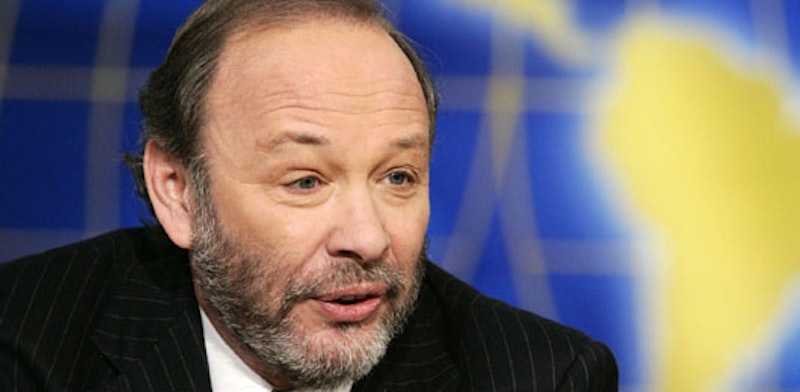Maybe Time’s Joe Klein was having a really crummy day. Maybe he’s feeling the pressure of blogging about the midterm elections—in addition to writing old-fashioned columns that afford him more than 15 minutes to gather his thoughts—so that Politico won’t embarrass his magazine yet again by coming up with a “scoop.” Or maybe the 64-year-old just hates his profession now and is ready to chuck it all and write non-political books, as he did a lifetime ago (1980) with the fine Woody Guthrie: A Life. I’m just speculating here, for it’s really a riddle as to why Klein would toss off such a condescending and hateful “Swampland” post about how his fellow American citizens are mostly idiots.
Reacting to a Senate candidate’s debate held in Delaware on Oct. 13 between Republican Christine O’Donnell and Democrat Chris Coons, Klein, after some requisite O’Donnell-bashing, writes: “There is something profoundly diseased about a society that idolizes its ignoramuses and disdains its experts. It is a society that no longer takes itself seriously.” I understand that the world moves a lot faster than a generation ago, when I read (and enjoyed) Klein’s political dispatches for Boston’s The Real Paper and Rolling Stone, but surely it’s not all that different than just two years ago when Klein and his ilk were celebrating the American electorate for its wisdom in electing Barack Obama as president. (He now labels the President’s politics as “abstruse.”) Is Klein saying that in 2008 our society didn’t take itself, or politics, seriously? If so, there are about 100,000 articles and scores of books that would claim otherwise.
Klein travels back to the 1940s, invoking the hero Jefferson Smith in Frank Capra’s Mr. Smith Goes to Washington, as the kind of “inspired amateur” who believed in the sanctity of government and the ideals upon which the United States was founded. He says, “[Smith] was part of a generation that took citizenship seriously and kept itself informed—even the ‘average’ folks, our grandparents, who came home from work on the assembly line and read the evening newspaper (which actually had news in it, unlike the crapola sensationalism that passes for news on cable TV). I’d take a couple of average citizens like that in the Senate anytime, especially if they made the effort to learn the issues once they got there.”
Klein specifically objects to someone like O’Donnell (or Sharron Angle, Ron Johnson and the “Tea Party know-nothings”) donning, perhaps subconsciously, the “lovely fantasy” that Capra’s movie represented. Capra was often full of malarkey, but so is Klein if he really believes that “average” citizens in the 1940s dutifully returned home from the “assembly line” and boned up on the political issues of the day. Some did, some didn’t, much like today. People read evening newspapers back then for late sports results, financial news and breaking stories, many of them about “sensational” crimes or the latest Hollywood scandal. Voting patterns have changed since the mid-20th century, and while apathy over elections has increased, so has the pool of people eligible to vote—blacks, of course, immigrants and young men and women who are 18 rather than 21. And American citizens are indisputably better educated than their grandparents.
So, once Klein is finished spitting out his diatribe about the swell of unqualified candidates this year—he must’ve forgotten Nebraska Sen. Roman Hruska’s 1970 defense of “mediocre” judges, politicians and the similarly mediocre Americans who deserved representation—he tramples on the “elites.” By way of example, he points to Steven Rattner, the onetime journalist (and close friend of New York Times publisher Arthur Sulzberger Jr.) who left the field for finance, made a fortune, and who recently copped a plea with the Securities and Exchange Commission for alleged bribery. Rattner, who briefly worked in the Obama administration, was fined $5 million and is at least temporarily barred from the industry.
Typically, getting into the inter-mingling of elites, as a media macher, Klein is on a first-name basis with Rattner. He writes: “I know Steve pretty well; I’ve had dinner at his house; we’ve had good conversations; our kids have played together.” And while Klein says he’s not directly blaming “Steve” for the rise of “Mama Grizzlies,” (or past Wall Street heavies like “Hank” Paulson or “Bob” Rubin), it’s because of men like him that someone like Christine O’Donnell could be nominated by her party for the office of senator. “[Rattner] is part of a generation of financiers, the most respected members in our society, who have been disgraced utterly by their greed and chicanery,” and as a result the inmates are now poised to take over the asylum.
It was always my understand, at least according to surveys produced by “experts,” that doctors, entrepreneurs, firemen and religious leaders were “the most respected members in our society,” and not millionaire dealmakers, but then again, my kids have never played with those of Steven Rattner.
When the Republicans took over Congress in 1994, the late ABC anchorman Peter Jennings proclaimed that American voters had a “temper tantrum.” I didn’t agree with Jennings 16 years ago, but maybe he was on to something, for more than any other profession, it appears that political reporters and pundits like Klein are the ones who need a time out.

